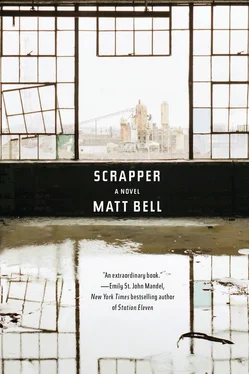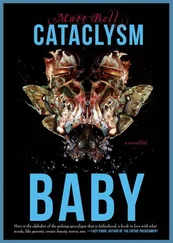He gained another five pounds, another ten, stopped weighing himself, promised himself it was temporary, tried to compensate with more calisthenics on the worn carpet of his living room. He drank out of the cupboard and he ate out of the freezer, cleared the least-wanted remnants of Christian charity. There was a limit to how much pasta salad a man could crave but he passed the limit and kept going. Whenever he was alone and he couldn’t sleep he sat down at the table, clicked open his pen and began to write, scrawled bits of memory, details about the house where he’d found the boy, the low room inside.
He’d traded away distraction but he had obsession and so who missed it. He started bringing the police scanner in from the truck with him every night, and if the girl with the limp was away at work or in her own bed, then he listened to the scanner in his, fell asleep to the addresses of gunshots, arson, domestic disturbance, animals abandoned, abused. Every human horror reduced to a number, a flattening of fear and disgust into numeric code. Names repeated, last name, first name, middle initial. Say again. License-plate numbers, makes and models. Say again, say again. The ringing in his ears meant Kelly struggled to separate meaning from sounds. The litany of the nighttime city. The squelch and the static obscuring speech, every word so distorted the casual listener might make a mistake.
He was more tight-lipped than anyone else but he still worried he might begin to leak his secrets whenever he shared an afternoon with the boy, whenever the girl with the limp came home to find him drunk and reeling, chair to wall to floor, bed to morning. When the boy wasn’t with Kelly he was with his parents in their separate homes, or else with the brother, who sometimes didn’t go to school, staying home while the father worked, while the mother worked too, preparing for a life without the father’s income, his grandparents’ support. The boy put Kelly’s name to use, said it into the telephone, when he answered the door, when Kelly picked him up after school. The boy said it was easy to confuse the parents, to do as the brother did to make room between them. The boy’s parents were more careful now but the only person they ever checked with was the boy. His phone rang constantly and the boy told them he was wherever they expected him to be.
The boy’s brother treated him rough too. It wasn’t the first time they saw each other when the boy told Kelly this part of the story but almost. From the moment of his adoption the brother had pinched the boy, twisted the skin on his arms when out of sight of their parents, when in the room they shared, in the twin beds for boys who were not twins. Don’t tell anyone, the boy said the brother said. Or else.
Kelly asked, Is that all? Is that the worst of it?
The boy looked away, covered half his face with one hand, tugged at his ear with the other. Kelly tried to take the boy’s hand away from his mouth but stopped when the boy recoiled. The boy and the brother hadn’t been in the same family long but already Kelly thought the boy flinched where he hadn’t flinched before.
You can tell me, Kelly said. What happens next?
Kelly saw the boy often had to prepare himself to speak. The boy wanted to share what was happening to him but Kelly thought it could take all afternoon for the boy to gather the force of a sentence. He didn’t push and the next time they were together in the apartment the boy began again, said, It’s easier to talk to you, and so Kelly said, Then talk.
Day by day Kelly felt a rough and growing affection for the boy, a swelling knocking about his chest. Sometimes Kelly woke in the night and walked his featureless hallway into the living room, looking for the boy even though the boy couldn’t be there. If the boy was there the television would have been on, the boy would be sitting on the floor with his homework spread across the carpet. There would be sound and light surrounding his presence, instead of only the standby hum of the television, the louder drone of the refrigerator. Only voices in the night. Kelly listened to his neighbors, the sounds of scuffling feet, of television and radio, the murmur of their conversations, the noises of sex and kitchen, the huffing slap of bodies and the clatter of dishes. Whenever he was alone he found himself pulling his phone from his pocket to answer phantom vibrations, imagined missed calls. The boy had never spent the night but Kelly knew he would let the boy if the boy asked. It was another bad idea but Kelly was full of them. The important thing was not to ask, not to let your need be known.
YOUR NAME WAS NOT IMPORTANT but you believed one day an inquiry would begin, an organized speculation of detectives and reporters asking who was he and who was the real him and how was a man like him made . To refuse these interrogators you scrubbed the name clean, restarted yourself, removed all of the old life’s worldly tarnish. You had a past but in the present it was only this you who remained, this you and a boy, one boy at a time. Or so it had been, before the intruder.
At birth you had been given up before being given a name, any name.
Later came the first name, the one ill fit for the child you’d become. Then your second name, the one you gave yourself. You hadn’t wanted a last name but the judge wouldn’t let you refuse one. The use of a middle initial was a matter of deep ambivalence to the court but at the last minute you chose an X , made to leave no box unmarked.
Someday reporters and detectives would repeat the name chosen, its simple syllables, its known unknownness a cipher standing in place of a man. They would debate the deepening of the mystery by the middle initial standing for nothing, the X in the middle of a name whose whole stood for nothing either, not even to you.
The boy was a phrase that was a moving target. There had been a number of boys but you were careful not to think too often in specifics. The given name: mere words elevated to description, to knowledge of what a thing was. How all the power resided in the giver. How without such a gift an individual could be made a type, how the type specimen could be returned to the herd.
When you were a boy you had been nameless and now you unnamed each boy.
Anonymous then, anonymous now. You were not a name but a watcher, dedicated to a philosophy of watching, of inaction except for where action was necessary, and there was no way to put a boy into a house except by the taking. What else couldn’t be omitted? Food for the boy, food and drink. Whatever could be fed from a bowl, served with a spoon at room temperature. Even for yourself you wouldn’t make anything more complicated, couldn’t see the point of intricacy.
You read but you were not good with books. Every written word was an abstraction instead of the thing. What use were articles, conjunctions, prepositions. The way an adjective or an adverb revealed nothing except a wrong-named object or action. But who could know all the right names against the vagueness of the world, the insufficient exactness of nouns. You didn’t want a better system but rather a removal of all systems, the reduction of complex things to their simplest parts. What you wanted was the irreducibility of a centermost point, occupied by a single set of figures. The hollow inside, the blank at the heart of mystery.
The few people who saw you thought you were a mute or else slow, but you could talk, think for yourself. Only in the manner of your choosing. Only at a time of your making. You would talk only to the next boy, vowed silence against all others. Until then you revealed nothing. No one would ever know your names for the gone boys. The story others told about you would not be the story of the boys. For it was always the killer who was remembered, never the killed.
Читать дальше












